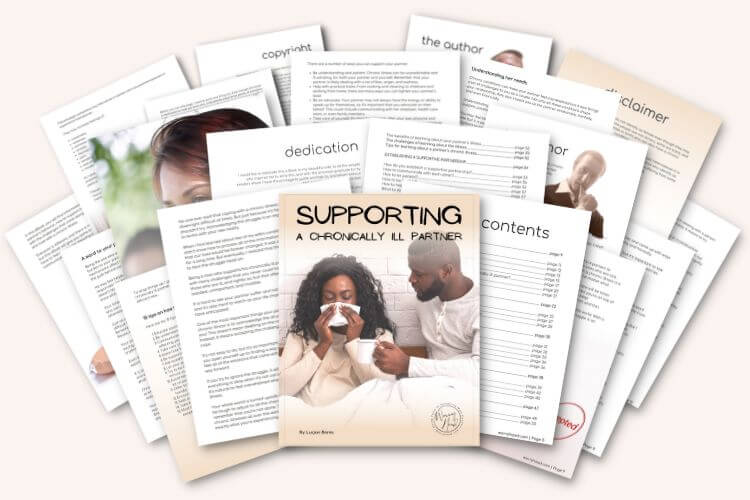Why your partner’s chronic illness affects you?
Trying to figure out why your partner’s chronic illness affects you can be tricky. It’s complicated because there are a lot of emotions involved. You may feel like you’re not as important as your partner’s chronic illness, or that your partner’s chronic illness takes priority over you.
It’s important to remember that your partner’s chronic illness doesn’t just affect them, it affects you too.
Every person is unique, every relationship is different, the circumstances, and the condition your partner suffers from. Taking all of the above into account, the simple answer to the question is, as always, “it depends.”
Let me begin by explaining why my partner’s chronic illness affects me. I explain this in the next paragraph…
Why my partner’s chronic illness affects me?
Being the husband of a woman who suffers from endometriosis and fibromyalgia, I used to ask myself this question, but after a decade of supporting her, I learned strategies for coping and helping my wife manage her chronic conditions better.
In order to find out why my partner’s chronic illness affects me, I needed to answer the following questions, that ideally, you should ask yourself too:
- How does chronic illness affect relationships?
- What chronic condition your partner suffers from?
- Why your partner’s chronic illness takes priority?
- Why your chronically ill partner takes priority instead of you?
- How can I be a good partner to someone with chronic illness?
These questions should help you identify why your partner’s chronic illness affects you. I answer them one by one below…
In the meantime, if you want to learn how to cope with your partner’s chronic illness, how to support her struggles, and manage a relationship with a chronic condition, I give away a FREE Chapter of my eBook: “Supporting a Chronically Ill Partner”.
This chapter alone has all the comprehensive information about acknowledging the struggles, including:
- A word to your partner.
- A word to you.
- Stepping on eggshells.
- Understanding her needs.
- How to acknowledge having a chronically ill partner?
- Acknowledging can be hard.
- 15 tips on how to do it!
Get the 1st Chapter FREE!
Chronic Illness for Partners

How does chronic illness affect relationships?
Chronic illness can take a toll on relationships. It can be difficult to cope with the stress of managing a chronic illness and the emotional support that is needed.
Chronic illness can make it difficult for couples to spend time together, be physically intimate, or even communicate. The chronic illness can also make it hard to socialize or go on vacations. All of these things can put a strain on the relationship.
It is important to remember that your partner’s chronic illness does not take priority over your relationship. I expand on the priority later.
Just remember that chronic illness can make it difficult to balance the needs of both of you. If you are in a relationship with someone with a chronic illness, it is important to be understanding and supportive.
What chronic condition your partner suffers from?
My wife suffers from endometriosis. She has stage IV and it’s deep infiltrating which is the worst stage and type of endometriosis.
Endometriosis is a chronic and often painful condition in which the tissue similar to the one that lines the uterus grows outside of it. This can cause severe pelvic pain, cramping, bloating, and fatigue. It can also lead to infertility.
My wife’s endometriosis affects me in a few ways:
- First, I have to be understanding and patient when she is in pain. I can’t just tell her to “suck it up” or that she’s being dramatic. I have to be there for her and help her through the pain.
- Second, I have to be understanding of the fact that her endometriosis takes priority. This means that sometimes she has to miss out on things that we had planned because she’s not feeling well.
- Lastly, I have to be supportive of her decisions regarding her treatment. This means that I may have to take on more responsibility around the house or with our child when she is in treatment.
Endometriosis is a debilitating chronic condition that can have a profound impact on every aspect of a sufferer’s life. It is also a condition that takes a significant toll on the partners.
My wife also suffers from fibromyalgia. Fibromyalgia is a chronic condition that can cause a great deal of widespread pain and fatigue. It can also cause brain fog, which is a condition that causes difficulties with thinking, memory, and concentration.
Chronic fatigue that it causes can be very difficult to deal with. It can make it hard to get things done or even enjoy activities that we used to love. The brain fog can be frustrating for both of us. It can be difficult to communicate and I often have to help her remember things or keep track of things.
But why your partner’s chronic illness takes priority?

Why your partner’s chronic illness takes priority?
I totally agree that those who are ill should be taken care of, and rightly so, but why your partner’s chronic illness takes priority if without your loving support she would struggle to get the best help?
Below you’ll find 5 reasons why your partner’s chronic illness takes priority:
- Because your partner’s chronic illness is a part of who she is today.
- Because your partner’s chronic illness affects every aspect of her life.
- Because your partner’s chronic illness is a 24/7 job.
- Because your partner’s chronic illness can be unpredictable and unpredictable can be scary.
- Because your partner’s chronic illness is something she cannot control.
These are just a few of the reasons why your partner’s chronic illness takes priority. It is important to remember that your partner is still the same person she was before her diagnosis. She is just dealing with a chronic illness.
So be supportive, understanding, and patient. Chronic illness is not easy to live with but with your support, she can get through it.
To better understand why your partner’s chronic illness affects you, we have two more questions to answer – “why your chronically ill partner takes priority instead of you” and “how can you be a good partner to someone with chronic illness?”
Why your chronically ill partner takes priority instead of you?
Here are 10 reasons why your chronically ill partner takes priority instead of you:
- Your partner is dealing with a lot of pain on a daily basis.
- Your partner’s chronic illness takes up a lot of time and energy.
- Your partner’s chronic illness can be very unpredictable.
- Your partner’s chronic illness can be very isolating.
- Your partner’s chronic illness can be very expensive.
- Your partner’s chronic illness can cause a lot of stress.
- Your partner’s chronic illness can affect your relationship.
- You may not be able to understand what your partner is going through.
- You may feel like you are in the shadow of your partner’s chronic illness.
- Your partner’s chronic illness can be hard to accept.
But don’t all of the above reasons affect you too?
Yes, but your chronically ill partner will always take priority over you because she is the one who is actually ill, not you. Furthermore, society expects those who care for the sick to make sacrifices, which can often lead to the neglect of their own needs.
I still find myself today sacrificing a part of myself, I often take my wife’s frustrations on the cheek, and I do my best to be understanding when really I am angry, frustrated, and even jealous over her being prioritized all the time.
It is not easy being in a relationship with someone with a chronic illness, but it is important to remember that your partner is not her illness. She is still the same person she was before and all you can do is move forward.
Luckily, I explain in the next paragraph how you can be a good partner to someone with chronic illness despite the challenges her condition imposes on you…
How can you be a good partner to someone with chronic illness?
To answer this question, I decided to list as many as 15 tips on how can you be a good partner to someone with chronic illness:
Educate yourself about your partner’s illness. The first step is always education. If you want to be a good partner, educate yourself about your partner’s chronic illness. This means learning about the symptoms, the flares, the treatments, and anything else related to the illness. The more you know, the better equipped you will be to deal with anything that comes up.
Communicate with your partner. Chronic illness can be very isolating, so it’s important to make sure that you’re communicating with your partner. This means talking about how they’re feeling, what their needs are, and what you can do to help. It’s also important to listen to your partner and validate their feelings.
Be patient. Chronic illness can be unpredictable, so it’s important to be patient with your partner. This means understanding that there may be days when your partner is feeling well and days when they’re not. It’s also important to be patient with the treatments and medications that your partner is taking.
Help with household tasks. Chronic illness can be exhausting, so it’s important to help out with household tasks. This means doing things like laundry, cooking, cleaning, and grocery shopping. If you can lighten your partner’s load, it will make a big difference.
Make time for fun and relaxation. It’s important to make time for fun and relaxation, even when life is chaotic. This means doing things like watching movies, going for walks, and spending time with friends and family. Taking a break from the stress of chronic illness can be very beneficial.
Help with financial burdens. Chronic illness can be very costly, so it’s important to help with the financial burden. This means things like paying for medication, co-pays, and treatments. It can also mean helping to cover the cost of lost wages if your partner is unable to work.
Be an advocate. Chronic illness can be overwhelming, so it’s important to be an advocate for your partner. This means being their voice when they’re too sick to speak up for themselves. It also means educating others about chronic illness and fighting for better treatment and care.
Offer emotional support. Chronic illness can be emotionally draining, so it’s important to offer emotional support. This means being there for your partner when they’re feeling sad, angry, or frustrated. It also means listening to them and offering words of encouragement.
Take care of yourself. It’s important to take care of yourself, both physically and emotionally. This means eating a healthy diet, exercising regularly, and getting enough sleep. It also means taking breaks when you need them and reaching out for help when you’re feeling overwhelmed.
Seek professional help. If you’re struggling to cope with your partner’s chronic illness, seek professional help. This can be in the form of therapy, support groups, or counseling. There are many resources available to help you deal with the challenges of chronic illness.
Be understanding. Chronic illness can be unpredictable, so it’s important to be understanding. This means accepting that there will be good days and bad days. It also means being understanding if your partner needs to cancel plans or miss an event.
Have realistic expectations. When you’re in a relationship with someone with a chronic illness, it’s important to have realistic expectations and understand that your partner may not be able to do everything that they used to do. It also means accepting that the illness may always be a part of your life.
Don’t take things personally. Chronic illness can cause a lot of stress, so it’s important not to take things personally. This means not getting upset if your partner is short-tempered or cancels plans. It also means not taking it personally if your partner needs more attention or care than usual.
Communicate openly. Chronic illness can be very challenging, so it’s important to communicate openly with your partner. This means talking about your concerns, fears, and frustrations. It also means being honest about what you can and can’t handle.
Seek support. If you’re struggling to cope with your partner’s chronic illness, seek out support from friends, family, or a professional. There are many resources available to help you deal with the challenges of chronic illness. Don’t be afraid to reach out for help when you need it.

Conclusion on why your partner’s chronic illness affects you?
There are many factors contributing to how your partner’s condition makes you feel. These include, but are not limited to:
- The severity of the chronic illness.
- Your role in your partner’s care.
- The level of support you receive from family and friends.
- How well do you cope with stress?
- Whether you have your own chronic illness or health condition.
For example, if your partner’s chronic illness is relatively mild, and you are not their primary caregiver, you may not feel a huge impact on your life. However, if your partner’s chronic illness is severe, and you are their primary caregiver, you may feel a significant impact.
The level of support you receive can also play a role in how chronic illness affects you. If you have a supportive network of family and friends, they can help you cope with the challenges you face. However, if you don’t have this support system, you may feel more isolated and alone.
How well you cope with stress is another important factor. If you’re someone who copes well with stress, you may find that you’re able to handle the challenges of your partner’s chronic illness better. However, if you’re someone who doesn’t cope well with stress, you may find that the challenges of your partner’s chronic illness are more difficult to handle.
If you have your own chronic illness or health condition, this can also impact how chronic illness affects you. This is because you may already be dealing with the challenges of managing your own condition, on top of supporting your partner. This can be a lot to manage and can lead to feelings of overwhelm and burnout.
In conclusion, there is no one-size-fits-all answer to the question of why your partner’s chronic illness affects you.
It depends on a variety of factors, including the severity of the chronic illness, your role in your partner’s care, the level of support you receive, how well you cope with stress, and whether you have your own chronic illness or health condition.
If you’re struggling to cope with your partner’s chronic illness, it’s important to seek out support from family and friends, as well as from professionals if needed.


About Me
Hi, I’m Lucjan! The reason why I decided to create this blog was my beautiful wife, who experienced a lot of pain in life, but also the lack of information about endometriosis and fibromyalgia for men…
